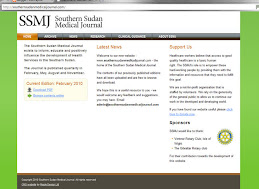Hello all. Week five is here already, hard to believe. My time in Juba continues to provide wonderful insights into a different culture, climate and continent. We are both learning a great deal, seeing things I’ve only read about in textbooks and remain grateful recipients of the kindness and good humour of the people in Juba.
Here follow some events and observations of mine from the past week or so. Those who know me will be all too familiar with my enjoyment in discussing all sorts of random facts and I’m afraid James’ blog gives me ample opportunity to do just that...
A note on language
The most commonly spoken language here is Juban Arabic – quite different from the classical Arabic spoken in the North, with its own vocabulary and pronunciation. Even to the untrained ear it is relatively easy to tell the two apart (even if you can’t understand what’s being said). We are picking up a few words – mostly medical I suppose. Hello is “salaam” thank you is “shukran” and pain is “waja”. As in, “waja-ras” – headache. At times our history taking is reduced to pointing at parts of the body and inquiring “waja?”
Since white folks here are called “kawaja” I certainly hope “ka” isn’t the Arabic for “arse”.
The language of medicine, including patient’s notes and prescriptions is (thankfully for us) English. Most of the staff in the hospital and a few of the patients have a very good command of English which is infinitely useful for us in our daily work.
Along with Arabic there are numerous tribal dialects spoken, reflecting the cultural diversity of this part of Africa. The Dinka, Nuer and Bari languages are spoken by those respective tribes along with many others, sometimes instead of Arabic. One of the medical officers (SHO doctors) revealed the other day that he speaks Arabic, English, Dinka, Nuer, Bari, Spanish (he trained in Cuba) and can even get by in Finnish!
As well as regional dialects, Juba attracts workers and travellers from all over Africa. We’ve seen several Kenyans and Ethiopians in particular with whom we speak English.
Today we witnessed a four way conversation from a Nubian to a Somalian to another Somalian who spoke in Arabic to Dr Andrew (the medical consultant) who kindly explained to James and I exactly what was going on in English! I think all of us, especially one of the Somalians, saw the humour in this somewhat bizarre interchange – especially as it was, rather predictably, about poo.
Sunday Morning
Last Sunday we had the pleasure of a trip to the Juba Cathedral with Father Joe (one of the Comboni priests that Dave and James stayed with last year). We arrived just at the end of the Arabic mass and watched Father Jo lead the English mass to a packed congregation. The cathedral itself is a huge concrete structure and the largest building I’ve yet seen in Juba, with a high arched ceiling, grand tropical hardwood doors and a fine aroma of burning incense.
There were hymns, prayers and bible readings from Father Joe and several members of the public. Also the President of Southern Sudan was present and walked directly past us on his way out!
I particularly liked the part at the end – I think it’s called “sharing the peace” - which is typically Juban I think. Everyone in the cathedral embarks on an attempt to shake hands with their neighbours and each person who is even remotely within reach. A break from what I would think of as the formality or grandiosity of some church services I found it to be quite a touching demonstration of brotherhood and togetherness.
Work
This last week we have been involved in some research regarding caesarean sections in JTH. Each caesar – elective or emergency – is recorded in the operating theatre logbook along with indication for surgery, type of anaesthetic and the baby/ babies’ weight and sex. Dr Murgani (consultant obstetrician and all round lovely man) asked us to look into some of this data last week as the information has been dutifully recorded for some time but not fully analysed.
As I’m sure Dave and James alluded to last year on their trip to Juba, opportunities for learning, teaching, research and hopefully being useful often come unlooked for and from unexpected sources.
Just wanted to point out that when James said “you might think from the above...” in last week’s entry, I’m fairly sure he wasn’t speaking in reference to the picture of the monkey scratching his bum which, by pure coincidence, was placed directly above. This would be terribly rude and not at all in line with the kind of serious image of ourselves we wish to portray. Hope that clears that up ;o)






No comments:
Post a Comment